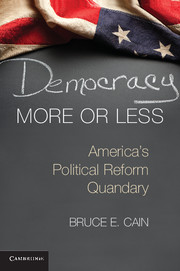Book contents
4 - Participation Paradoxes
Published online by Cambridge University Press: 05 December 2014
Summary
Full citizen participation is the gold standard of democratic design. Engaged citizens have more interest in and knowledge about civic matters (Delli Carpini, 1996). Widespread participation also lessens potential biases in representation and policy (Bennett and Resnick, 1990; Hill Quaile and Leighley, 1992; Hill Quaile, Leighley, and Hinton-Andersson, 1995). Often participation rates are treated as measures of a democracy’s health, albeit cautiously since simple cross-national comparisons can be misleading as the result of important differences in laws and political structure (Kekic, 2007). But what Americans actually mean by full citizen participation continues to evolve, as do the consequences of falling short of this democratic ideal.
The earliest meanings of full citizen participation centered on electoral activities – voting to be sure, but also various related volunteer activities such as canvassing, distributing literature, getting out the vote, talking to others about elections, displaying lawn signs and the like. Because it was traditionally voting centered, citizen engagement was primarily timed to electoral cycles, focused on representatives and oriented toward retrospective accountability, not continuous monitoring and control.
Over time, the meaning of full citizen participation in the United States expanded in several dimensions. “Full” came to mean “more inclusive,” ending the franchise restrictions that excluded women and minorities. While those decisions are now settled doctrine (Issacharoff and Pildes, 1998a), the current franchise controversies are whether to extend voting rights to some noncitizen immigrants and restore them for ex-felons.
- Type
- Chapter
- Information
- Democracy More or LessAmerica's Political Reform Quandary, pp. 68 - 91Publisher: Cambridge University PressPrint publication year: 2014



